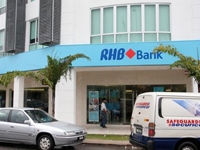Malaysia
BNP Paribas Bank Polska to utilize Teradata's CRM software as retail banking tool
Through the Aprimo Relationship Manager, the bank will be able to efficiently provide customers with the right financial product or service.
BNP Paribas Bank Polska to utilize Teradata's CRM software as retail banking tool
Through the Aprimo Relationship Manager, the bank will be able to efficiently provide customers with the right financial product or service.
Citibank in Malaysia targets 100,000 new cardholders
Citibank Bhd expects to attract 100,000 new cardholders over the next three years with its newly-enhanced Giant-Citibank Credit Card.
Malaysia aims to become global Islamic finance centre
The government targets further enhancing stakeholders' confidence and enhance the integrity of the Islamic financial industry.
RHB-OSK merger yet to get Bank Negara’s nod
Analysts believe Malaysia’s central bank’s approval will come if it will be supportive of consolidation of the banking sector.
Malaysia to boost efforts to become Global Islamic Finance hub
Malaysia will continue its efforts to strengthen its position as an international Islamic financial centre and contribute towards the internationalisation of Islamic finance.
Foong to lead strategy and change at Maybank
The Maybank group announced the appointment of Michael Foong Seong Yew as its chief strategy and transformation officer.
Maybank names Michael Foong Seong Yew as Chief Strategy Officer
The ex-managing director of Accenture PLC’s management is tasked to oversee the group’s corporate development office.
RHB and Credit Guarantee Corporation to enhance SME financing
The tie-up’s Enhancer Direct scheme to assist viable SMEs that are unable to secure financing due to insufficient collateral.
Maybank Community Service Financial Revenue To Grow To RM12 Billion In 2015
Maybank expects its community financial services revenue to grow to RM12 billion in 2015, from the current RM6 billion.
OSK-RHB merger to be among Malaysia’s top investment banks
Once completed, the merger will overtake CIMB Securities which is currently leading with a market share of 10.5%.
Maybank Islamic eyes steady contribution from asset financing to parent
27% of Maybank Group's total loan and advances come from its Islamic unit.
Takaful: Insurance revolution in Islamic finance
Islamic Finance Industry: Alpha & Omega The enactment of the Islamic Banking Act in 1983 spawned a new paradigm of banking in Malaysia. The establishment of the first Islamic bank (namely Bank Islam Malaysia) in 1983 and subsequently Takaful Malaysia in 1984 provided an alternative means for Shariah compliant fund placements and management. Since its inception, the industry has gained staggering momentum and Malaysia is currently regarded as a leading contributor in the Islamic finance industry. This development has mainly been driven by the government’s efforts in promoting the industry and providing incentives to boost growth. The Islamic finance industry has various components but the most notable is Takaful, which makes Islamic finance unique. Currently there are 12 Takaful operators in Malaysia (with four new licenses issued since 2009) and 4 re-Takaful operators. Bank Negara Malaysia (BNM) indicates the Takaful industry has been growing rapidly, appealing to both Muslims and non-Muslims. The industry is expected to grow by 15-20 percent annually, with contributions expected to reach USD7.4 billion by 2015.1 Speaking in Kuala Lumpur in April 2011, the former deputy governor of BNM, the late Datuk Mohd Razif bin Abd Kadir, indicated the Takaful industry had a compound average growth rate of 27 percent in terms of net contributions between 2005–2010, with family Takaful driving growth at 28 percent for the same period and dominating more than 80 percent of the total Takaful market in 2010.2 Takaful & Re-Takaful: The Basis of Shariah Compliant Insurance The prevailing needs of the Muslim community looking for a Shariah compliant alternative to conventional insurance accelerated the development of the Takaful industry in Malaysia. This, in addition to the uprising of the Islamic banking sector, boosted the Takaful industry to its present more refined and matured form. In 1982, the Malaysian government set up a task force to study the feasibility of creating an Islamic insurance company. The move was triggered by the Malaysian National Fatwa Committee’s decree, which ruled the current form of life insurance a void contract due to the presence of the elements of Gharar (uncertainty), Riba’ (usury) and Maisir (gambling).3 This was further strengthened by the introduction of the Takaful Act enacted in 1984 and the incorporation of the first Takaful operator in Malaysia in November of the same year. Takaful is a form of Shariah compliant insurance. The word originates from Arabic and is defined as ‘joint guarantee’. A Takaful fund is a fund in which participants contribute a sum of money to be used to assist participants against a defined loss or damage. The operator entrusted to manage these funds on behalf of the participants usually earns a fee known as the agency or Wakalah fee. However, depending on the variations of the Takaful fund’s operations, some operators may also earn profit from the investment of its shareholders' funds, or receive a share of the investment profit or any surplus of the Takaful funds based on an agreed contract.3 In all instances, the operator is usually indemnified of any loses that the investment may incur. The Takaful industry is broadly divided into family Takaful business (Islamic "life" insurance) and general Takaful business (Islamic general insurance). In Malaysia, Takaful operators have flexibility in choosing either the Mudharabah (profit-sharing) or Wakalah (agency) operational models in compliance with Shariah principles and prudential requirements. The Mudharabah model, more commonly used in Malaysia and the Asia Pacific region, provides an incentive for the operator to perform careful underwriting, to manage claims judiciously and to limit selling expenses so as to increase its return on management/shareholder capital and efforts. The Wakalah model, used in the Middle East, is seen to be relatively more transparent since fees are clearly related to an operator’s operational costs.
Public Bank's low share price warns of downside risk for banks
Public Bank's share price fell to almost a year low in late September, closing 16 sen lower at RM12.04, according to Bernama.
Bank Rakyat expects profits to reach RM2 B
Bank Rakyat expects its profit before tax and zakat to reach RM2 billion for its current financial year ending Dec 31, 2011.
Maybank expects strong growth in Community Service Financial sector
Maybank expects its community financial services revenue to grow to RM12 billion in 2015, from the current RM6 billion, due partly to increases in businesses derived from its transformed branches.
AmBank Group to introduce ANZ's Signature Priority Banking
AmBank Group and ANZ have signed an MoU to introduce ANZ's Signature Priority Banking service to AmBank and AmIslamic Bank's affluent retail banking customers.
UOB, OCBC lend $105M to Yinson Securities
Yinson Holdings has signed agreements with UOB Group and Oversea-Chinese Banking Corp Ltd for a US$105 million or RM334.2 million loan.











 Advertise
Advertise




















